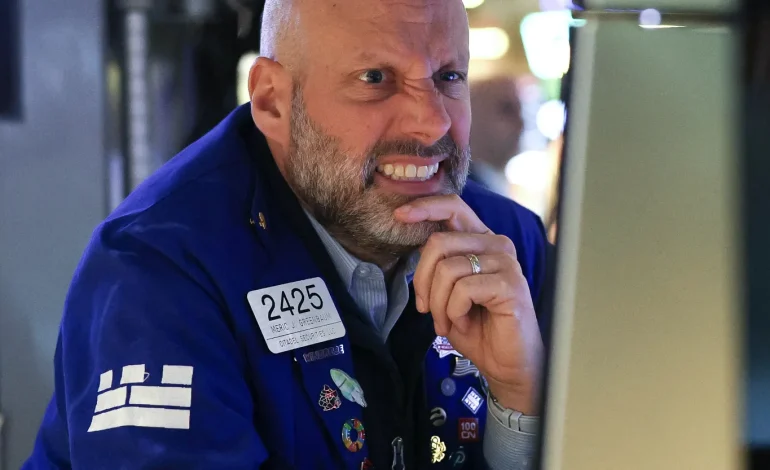US stocks took a significant hit on Monday as markets experienced extreme volatility following President Trump’s announcement of widespread tariffs on US trading partners, including China.
The White House stood firm despite the shockwaves rippling through global financial markets, as the President threatened even higher tariffs on China, escalating tensions in an already fraught trade war.
The S&P 500 slid 1.9%, edging closer to bear market territory with a nearly 20% drop from its February peak. At one point during the session, the index was already in bear market territory. The Dow Jones Industrial Average plummeted by 988 points, or 2.6%, marking its third consecutive day of losses following last week’s staggering 1,500-point drops. Meanwhile, the Nasdaq Composite fell 1.8%, deepening its plunge into bear market territory and losing 24% from its previous highs.
The market briefly rallied in the morning, fueled by rumors of a potential pause in the tariff escalation. However, the White House swiftly denied the speculation, calling reports of a 90-day tariff hiatus “fake news.” Trump’s unilateral 10% tariff on various goods went into effect on Saturday, heightening concerns of a prolonged global trade dispute. Investors had hoped for signs of negotiations or even a delay in reciprocal tariffs set to take effect on April 9, but the administration dismissed those hopes.
Trump, undeterred by the market turmoil, took to social media to threaten even higher tariffs on China. He stated that if China did not withdraw its 34% tariff on US imports by April 8, the US would impose a 50% tariff, further heightening uncertainty. Commerce Secretary Howard Lutnick reinforced this stance, stating that tariffs would not be delayed.
The sharp decline in the market came as investors reevaluated the broader economic implications of these tariffs. Stock prices are closely tied to corporate revenue and profits, and analysts warn that higher tariffs could impede sales growth and squeeze corporate margins. The reaction was swift, with widespread sell-offs across asset classes, including tech stocks, commodities, and cryptocurrencies.
International markets also felt the impact, with major indices in Asia and Europe registering steep losses. Hong Kong’s Hang Seng Index, for example, dropped by 13%, its largest decline since the 1997 financial crisis. The price of oil fell below $60 per barrel, while Bitcoin tumbled below $77,000.
The market slump has prompted warnings from several market analysts, including CNBC’s Jim Cramer, who expressed concerns about the possibility of a “Black Monday” scenario reminiscent of the 1987 stock market crash. Other economists, such as Lawrence Summers, have suggested that the sharp market moves signal further turbulence ahead, urging caution as global trade tensions continue to escalate.
Bill Ackman, a billionaire hedge fund manager, called on President Trump to reconsider the tariff hikes, warning that the US could be headed toward an “economic nuclear winter.” He suggested that a “time out” could allow for a reevaluation of the trade strategy before the situation worsens.
Despite the negative market sentiment, some remain hopeful that the market will recover once the dust settles. White House trade advisor Peter Navarro reassured investors that the administration’s aggressive trade policies would ultimately result in a “boom” for the US economy.
As the day unfolded, the S&P 500 continued to fluctuate wildly, at one point swinging between a 4.7% loss and a 3.4% gain in a matter of minutes, marking one of the largest intraday swings since March 2020. However, the index later fell back into negative territory, continuing the downward trend that has marked the past few days of trading.
With input from CNBC, the Wall Street Journal, the Street, and Newsweek.










The latest news in your social feeds
Subscribe to our social media platforms to stay tuned